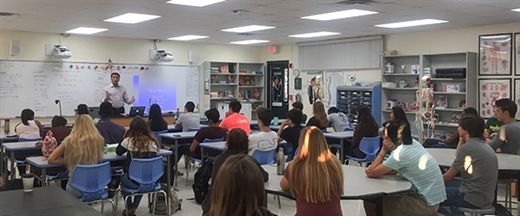

Dr. Pansuriya, pulmonologist, Visits the Pre-Med Club
Source/Author: Jacqui Barnes '19
May 11, 2018
Shorecrest Upper School Anatomy and Physiology students and Pre-Med club members were given the opportunity to hear from Dr. Pansuriya, a Pulmonologist in St. Petersburg who is also a Shorecrest parent.
Dr. Pansuriya told us about his experience of growing up in India and the school system in India. In India, according to Dr. Pansuriya, in primary school all the grades were put together so you would grow up with 800 children in one class. Students make a career path decision in tenth grade, since they go straight to graduate or medical school. Dr. Pansuriya decided to be a doctor, so he went to medical school after high school and was able to start practicing medicine at the age of 24. While talking about schooling, Dr. Pansuriya emphasized the competitive atmosphere that he experienced in schools and emphasized the importance of academic rankings while in school.
When Dr. Pansuriya came to the United States, he took multiple board exams to become a licensed doctor here. Dr. Pansuriya then described to us his average daily routine now that he is an established doctor. His routine includes waking up at 7am every morning to do rounds on his more critical patients at hospitals (Bayfront, St. Anthony's, and Northside Hospital) and then he goes to his private practice to meet with patients who have made appointments.
Dr. Pansuriya described the procedures that he does in his specialty, such as doing bronchoscope procedures that go through the throat and down into the airways in and the lungs, and thorax fluoroscopy which is a X-ray exam to see the functionality of a patient's lungs. Dr. Pansuriya explained that in his specialty almost all the procedures are bloodless, and his main focus in his private practice is sleep apnea. Sleep apnea causes a patient to stop breathing multiple times throughout the night due to the tongue blocking the opening of the soft palate. He said the most common treatment for sleep apnea, which can be considered basic, moderate, or extreme based on amount of times someone stops breathing while sleeping, is to prescribe a CPAP (Continuous Positive Airway Pressure therapy) Machine for the patient to help them breathe throughout the night by increasing air pressure in order to keep the patient's throat open.
The students very much enjoyed Dr. Pansuriya's visit, as well as learning a lot about the pulmonary system.
Dr. Pansuriya told us about his experience of growing up in India and the school system in India. In India, according to Dr. Pansuriya, in primary school all the grades were put together so you would grow up with 800 children in one class. Students make a career path decision in tenth grade, since they go straight to graduate or medical school. Dr. Pansuriya decided to be a doctor, so he went to medical school after high school and was able to start practicing medicine at the age of 24. While talking about schooling, Dr. Pansuriya emphasized the competitive atmosphere that he experienced in schools and emphasized the importance of academic rankings while in school.
When Dr. Pansuriya came to the United States, he took multiple board exams to become a licensed doctor here. Dr. Pansuriya then described to us his average daily routine now that he is an established doctor. His routine includes waking up at 7am every morning to do rounds on his more critical patients at hospitals (Bayfront, St. Anthony's, and Northside Hospital) and then he goes to his private practice to meet with patients who have made appointments.
Dr. Pansuriya described the procedures that he does in his specialty, such as doing bronchoscope procedures that go through the throat and down into the airways in and the lungs, and thorax fluoroscopy which is a X-ray exam to see the functionality of a patient's lungs. Dr. Pansuriya explained that in his specialty almost all the procedures are bloodless, and his main focus in his private practice is sleep apnea. Sleep apnea causes a patient to stop breathing multiple times throughout the night due to the tongue blocking the opening of the soft palate. He said the most common treatment for sleep apnea, which can be considered basic, moderate, or extreme based on amount of times someone stops breathing while sleeping, is to prescribe a CPAP (Continuous Positive Airway Pressure therapy) Machine for the patient to help them breathe throughout the night by increasing air pressure in order to keep the patient's throat open.
The students very much enjoyed Dr. Pansuriya's visit, as well as learning a lot about the pulmonary system.



















.png&command_2=resize&height_2=85)




